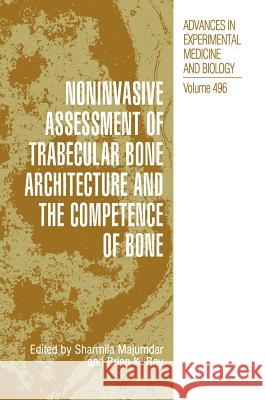Noninvasive Assessment of Trabecular Bone Architecture and the Competence of Bone » książka
Noninvasive Assessment of Trabecular Bone Architecture and the Competence of Bone
ISBN-13: 9780306466175 / Angielski / Twarda / 2001 / 227 str.
Noninvasive Assessment of Trabecular Bone Architecture and the Competence of Bone
ISBN-13: 9780306466175 / Angielski / Twarda / 2001 / 227 str.
(netto: 651,74 VAT: 5%)
Najniższa cena z 30 dni: 655,41
ok. 16-18 dni roboczych.
Darmowa dostawa!
Sharmila Majumdar In the area of osteoporosis and skeletal changes, it is currently accepted that bone mineral density (BMD), widely used for screening, monitoring and assessing therapeutic efficacy, does not adequately explain the pathogenesis of osteoporosis, the process of aging, or the therapeutic efficacy of various treatments. In this context, trabecular micro architecture has enormous potential to contribute to understanding the pathophysiology of osteopor.osis and therapy assessment. The use and value of noninvasive imaging and quantitative image analysis and processing of trabecular bone micro-architecture have increased dramatically due to recent advances in instrumentation and software. This emerging field is diverse, interdisciplinary, and encompasses many different imaging modalities. Interested researchers include those involved in technique development, basic science and animal studies, as well as clinical researchers and practicing physicians. With the growth of this area of research, a group of investigators at the 11th Interna tional Workshop of Bone Densitometry, 1 concluded that a forum dedicated to this matter was urgently needed. With this agenda, Dr. Peter Ruegsegger organized the first sympo 2 sium on conjunction with the 10th Conference of the European Society of Biomechanics. The symposium on Bone Architecture and Competence was a two-hourlong event which resulted in five chapters in Bone Research and Biomechanics, edited by G. Lowet, P. Ruegsegger, H. Weinans, and A. Meunier, published by lOS Press, 1997. The second symposium was held as a pre-symposium to the 12th Workshop on Bone Denistometry,3 and flourished as a daylong event.











